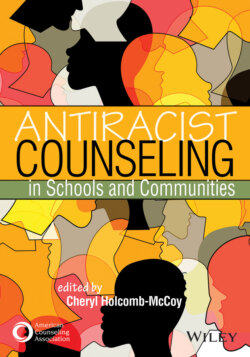Читать книгу Antiracist Counseling in Schools and Communities - Группа авторов - Страница 27
Defining Antiracism
ОглавлениеThe beauty of antiracism is that you don’t have to pretend to be free of racism to be an antiracist. Antiracism is the commitment to fight racism wherever you find it, including in yourself. And it’s the only way forward.
—Ijeoma Oluo
Recently, literature about racism and antiracism—like Ijeoma Oluo’s So You Want to Talk About Race, Ibram Kendi’s How to Be an Antiracist, and Robin DiAngelo’s White Fragility—has risen to the top of the New York Times best sellers list. But what is antiracism? Simply put, being antiracist refers to taking an active approach to dismantling racist practices, racial hatred, systemic racism, and the oppression of historically oppressed racial groups. In Britain, antiracism evolved as a critique of the multicultural education movement, which some believed accepted deficit perspectives of Black and Brown students and ignored the systems and policies that resulted in uneven student outcomes (Gillborn, 2006). Thus, antiracism in education focuses on the dominant systems that uphold racist views and ideas, like standardized testing, curriculum, educator preparation, discipline, and other schooling policies that disproportionately impact Black and Brown communities.
Although there is a plethora of literature on the history of slavery in the United States and on movements against slavery (e.g., abolition), there is a lack of literature describing the history of antiracist thought. William Lloyd Garrison emerged as a prominent abolitionist and early antiracist. Garrison founded the newspaper The Liberator and the American Anti-Slavery Society. Initially fearful of integrating former slaves into white society, Garrison later talked about his flawed thinking, openly discussed the horrors of slavery, and advocated for abolition.
Herbert Aptheker (1992), a historian and controversial political activist, wrote one of the few U.S. books to use antiracism as a construct before the 2000s. The book, titled Anti-Racism in U.S. History: The First Two Hundred Years, challenged the view that whites universally accepted racism. Aptheker attempted to debunk the myth that white people never cared about the plight of African Americans until just before the outbreak of the Civil War.
Angela Davis, a feminist and political activist, has written extensively about antiracism and more specifically the idea that antiracism must disrupt the social constructions of both race and gender (Davis, 1981, 1985). For many years, Davis has argued that racism, sexism, capitalism, and heterosexism work together to compound oppression. Her famous quote “In a racist society it is not enough to be nonracist, we must be antiracist” has become popular and is a defining aspect of today’s conceptualization of antiracism.
